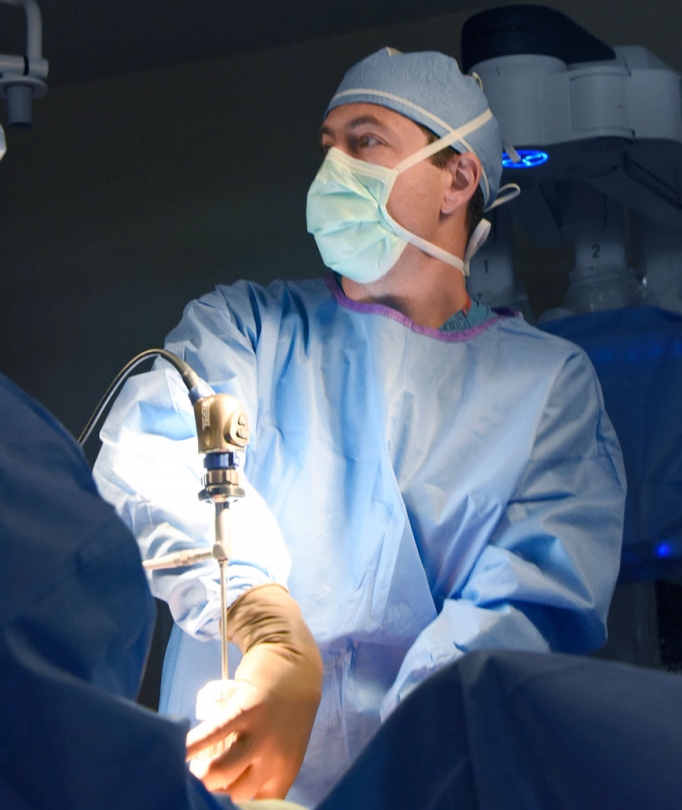Treatment for an Uncomfortable Situation:
Pelvic Relaxation

Dr. Brad Campbell
McLeod OB/GYN Associates
Pelvic relaxation may sound like something pleasant but that is definitely not the case. The phrase is another way of describing pelvic organ prolapse, a condition that occurs when the pelvic floor – the muscles, ligaments, connective tissue and nerves that support and control the bladder, uterus, vagina and rectum – becomes weakened or damaged.
As a result, one or more pelvic organs drop, or “prolapse,” below their normal position and press against the walls of the vagina.
Multiple vaginal births, large babies, obesity, aging and high-impact activities or chronic straining due to constipation are among the risk factors and causes for pelvic relaxation.
Even women as young as 20 can suffer from prolapse.
Pelvic organ prolapse develops in three different ways:
- Uterine Prolapse. The uterus drops down into the vagina.
- Anterior (front) Wall Prolapse. In these cases, the bladder or urethra (the tube carrying urine) pushes into the vaginal wall from the front.
- Posterior (back) Wall Prolapse. The rectum or intestines can detach and fall into the vagina from the back.
Symptoms. Symptoms of pelvic prolapse range from a low backache to painful sexual intercourse and frequent urination. Most women with prolapse will feel discomfort and pressure in the pelvis. Women describe this as a “feeling of fullness” or “sitting on a small ball.”
Pelvic organ prolapse may develop very slowly. However, in the most severe cases, a woman’s organs can appear outside her vagina.
Treatment. There are a number of effective ways to treat and correct the condition. For mild cases, losing weight and avoiding heavy lifting can sometimes relieve prolapse symptoms. Other non-surgical options include Kegel exercises to strengthen the pelvic muscle and pelvic floor physical therapy as well as a pessary – a rubber or plastic shaped donut that holds the organs in place – which can be inserted during a doctor’s office visit.
When lifestyle modifications, medication and other conservative approaches such as pelvic floor therapy are no longer effective treatments, pelvic floor reconstruction – a group of surgical procedures used to treat prolapse – may be the best solution.
About 3 in 10 women require surgery to correct the problem.
The goal of pelvic floor reconstruction is to restore the normal structure and function of the female pelvic organs.
These surgeries can be performed with a minimally invasive or robotic-assisted approach.
Robot-assisted surgery has all of the advantages of minimally invasive surgery, including less postoperative pain, smaller incisions, minimal scarring, shorter hospital stay, faster recovery time, and a quicker return to normal activities.
Additional advantages for the surgeon that lead to benefits for the patient include:
- The robotic instruments are designed to reach the exact angle to stop a blood vessel’s bleeding.
- All the robot’s movements are very smooth and precise, minimizing damage to surrounding tissue and organs.
- Overall, there’s less blood loss and damage to surrounding tissue as well as a lower risk of infection compared to open procedures.
Most prolapse operations are done as same-day surgery, although some patients stay in the hospital a day or two.
The good news is that 75 to 90 percent of women who have pelvic floor reconstruction surgery experience a long-term cure for their condition.
Although the “pelvic relaxation” may not be a comfortable situation, you can rest assured that there are a number of very effective ways to treat and correct the condition. The first step is reporting these signs and symptoms to your physician and seeking answers to improve your quality of life.
To learn more about women’s health treatment options offered at McLeod, please call (843) 777-7400. For additional information on pelvic health issues or to sign up for a blog about women’s health, visit www.McLeodPelvicHealth.org.
Dr. Brad Campbell cares for patients at McLeod OB/GYN Associates. Board certified in Obstetrics and Gynecology, Dr. Campbell received his medical degree from the Medical University of South Carolina. He also completed a residency in Obstetrics and Gynecology at the Medical University of South Carolina. To make an appointment with Dr. Campbell, please call (843) 777-7400.
-
McLEOD REGIONAL MEDICAL CENTER FLORENCE
843-777-2000 -
McLEOD DARLINGTON
843-777-1100 -
McLEOD DILLON
843-774-4111 -
McLEOD LORIS
843-716-7000 -
McLEOD SEACOAST
843-390-8100 -
McLEOD CHERAW
843-537-7881 -
McLEOD CLARENDON
803-433-3000



-
McLEOD REGIONAL MEDICAL CENTER FLORENCE
843-777-2000 -
McLEOD DARLINGTON
843-777-1100 -
McLEOD DILLON
843-774-4111 -
McLEOD LORIS
843-716-7000 -
McLEOD SEACOAST
843-390-8100 -
McLEOD CHERAW
843-537-7881 -
McLEOD CLARENDON
803-433-3000
 Find a Doctor
Find a Doctor  Locations
Locations  Services
Services